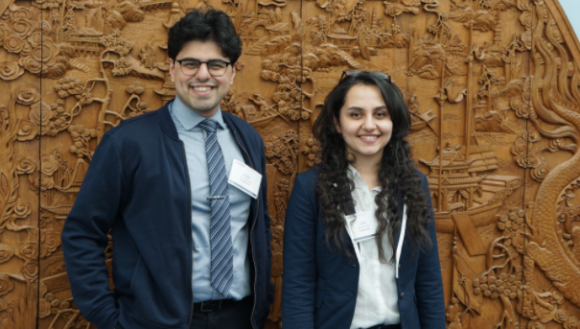When their paths crossed as high school students, Leila Daneshmandi and Armin Tahmasbi Rad never imagined they would create a company together as adults. By chance, they both attended the same high school and undergraduate college in Iran and then reconnected in graduate school at the University of Connecticut a few years later while taking a class on technology innovation and entrepreneurship.
“I didn't even know what it meant to be an entrepreneur,” recalls Daneshmandi, who was a biomedical engineering student at the time. “I didn't know what that term was. And I certainly never imagined that this world of entrepreneurship would be a world that I would end up in.”
Now in its third year of operation, Daneshmandi and Rad’s company Encapsulate is working on a platform to grow cancer patients’ cells outside of their bodies to help inform their treatments. They are working to address a major challenge in cancer treatment, which is to get the most effective combination of FDA-cleared drugs to individual patients.
Rad explains that oncologists have to choose from some 500 different combinations of more than 20 different drugs for each cancer patient. Depending on the doctor’s personal experience, previous patients, and other factors, the doctor will pick a regimen, which may not be effective for any given individual. When a regimen is ineffective, patients must undergo additional cycles of chemotherapy. “The problem is that after each ineffective treatment, the chance of treating patients gets lower, as the tumor gets more and more resistant to chemotherapy and then spreads,” Rad says.
“If something is intriguing to you, go after it. And also please be confident. ... everyone started from somewhere and everyone has learned along the way. — Daneshmandi
Rad and Daneshmandi, who were featured guests at ABE Los Angeles’ virtual summit for students this past spring, want to make it quicker and easier for the doctor to pick the most effective combination that will work for a specific patient’s cancer. In early trials, their technology platform has been able to create copies of cells from samples of patients’ tumors and then run them through various tests to yield results on the best drug combinations within 10 days total. They are now moving forward with a larger scale clinical study with 150 colon cancer patients.
The transition to entrepreneurship from PhD life was unexpected for both researchers. The class they took on entrepreneurship was transformative: “The experience that we have had in that class was that yes, you can certainly start a company if you have a good idea and if you think you have a valuable product that fills a need in the clinic or in the industry,” Radsays. “We learned to go for it. Why not?”
Both Rad and Daneshmandi grew up in Iran, living and attending school through undergraduate college there until moving to the United States for graduate school. Daneshmandi remembers wanting to be a medical doctor when she was in high school and then transitioning to engineering to help solve problems. “Going into biomedical engineering, I think, was one of the best decisions I ever made,” she says. “I had a problem-solving mindset and wanted to think about solving problems that were related to medicine.”
On a similar parallel path, Rad also remembers considering medicine before deciding on biomedical engineering. In undergraduate school, he was involved in many different projects, including implants for bone replacement and liver tissue regeneration for patients suffering from alcoholism.
At the University of Connecticut for graduate school, their interests converged around cancer research. They also found a supportive community, including strong mentorship. One mentor was Hadi Bozorgmanesh, whom they met in their first entrepreneurship class at the time and who has nurtured Rad and Daneshmandi on their paths. “He really injects this idea of entrepreneurship and passion into your mind,” Radsays, “focusing on problem solving and seeking solutions.”
At their own company, Encapsulate, Daneshmandi and Rad now serve as mentors to others, including graduate and undergraduate students at the University of Connecticut who come to work and train with them. “We have students from pharmacy, and we have students from the schools of chemical, biomedical, and mechanical engineering, because you have to cover many different aspects for a complex project like this,” Rad says. “I didn't know what entrepreneurship was in my PhD, and now students are coming in and they're learning what a startup does, and what goes on behind the scenes, the day-to-day operations, and more, which is pretty remarkable. And just being in this setting sparks an idea in their mind about the entrepreneurial mindset.”
As the company expands, they are also planning for a new data science component to help manage their datasets as they grow. “We always have an eye to the future, looking at trends for the future of the industry to align with the company,” Rad says.
Daneshmandi advises students with an interest in science to get as much exposure to different fields as possible, whether through reading articles or books, attending events, and talking with people in their field of interest. “There is no reason to hold yourself back,” she says. “If something is intriguing to you, go after it. And also please be confident. This is something I still struggle with as a woman in science, but everyone started from somewhere and everyone has learned along the way.”
